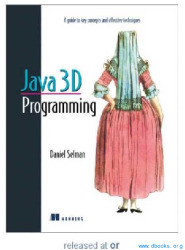Java 3D Programming
The author distills 12 months of using the Java 3D API for commercial projects, as well as innumerable discussions on the Java 3D email list into a book that all Java 3D developers will appreciate. Experienced Java 3D developers will applaud an authoritative resource containing the state-of-the-art in techniques and workarounds, while novice Java 3D programmers will gain a fast-track into Java 3D development, avoiding the confusion, frustration and time wasted learning Java 3D techniques and terminology.
Java 3D Programming comes complete with a comprehensive set of programming examples to illustrate the techniques, features, workarounds and bug fixes contained in the main text.
Table of contents
- What is Java 3D and is it for me?
- 3D graphics programming
- Getting started, Hello Java 3D!
- The scenegraph
- Scenegraph node reference
- Defining the universe
- Data model design
- Geometry reference
- Setting geometry appearances
- Lights
- Behaviors - navigation, alignment, and LOD
- Using Interpolator behaviors
- Writing custom behaviors
- Using texture images
- Geometry utility classes and object loaders
- Object interaction?picking and collision detection
- Java 3D, Swing, and applets
- Java 3D system architecture
| Pages : | 352 |
| Size : | 4.5 MB |
| File type : | |
| Downloads: | 141 |
| Created: | 2022-02-03 |
| License: | GNU GPL |
| Author(s): | Daniel Selman |

Warning: Trying to access array offset on false in /home/tutovnfz/public_html/article.php on line 233
Others programming Tutorials
Fundamentals of C++ Programming
Professor Frisby's Mostly Adequate Guide to Functional Programming
Principles of Programming Languages
Others related eBooks about Java 3D Programming
Building Skills in Python: A Programmer's Introduction to PythonThis book is a complete presentation of the Python language. It is oriented toward learning, which involves accumulating many closely intertwined concepts. In our experience teaching, coaching and doing programming, there is an upper limit on the "clue absorption rate". In order to keep within thi...
Artificial Neural NetworksArtificial Neural Networks (ANN) are state-of-the-art, trainable algorithms that emulate certain major aspects in the functioning of the human brain. This gives them a unique, self-training ability, the ability to formalize unclassified information and, most importantly, the ability to make foreca...
Problem Solving with Algorithms and Data StructuresDownload free tutorial in Algorithms and data structures created by Brad Miller and David ranum....
Learning C#Download free course Learning C#, pdf file on 1008 pages by Stack Overflow Community....
Learn ProgrammingDownload free course Learn Programming, pdf file on 465 pages by Antti Salonen....
Evolve the Monolith to Microservices with Java and NodeDownload free course Evolve the Monolith to Microservices with Java and Node, pdf file on 132 pages by Sandro De Santis, Luis Florez, Duy V Nguyen, Eduardo Rosa....
RESTful Web ServicesWith this tutorial you will learn how to build a Web Services with REST protocol ,a free training document material under 148 pages by John Cowan....
Programming in ADA, PDF TutorialLearn Programming in ADA, a complet PDF Tutorial by Wikibooks contributors....
Raspberry Pi Projects BookDownload free course Raspberry Pi Projects Book, pdf file on 204 pages by Wes Archer, David Crookes, PJ Evans, Gareth Halfacree, Rosie Hattersley, Nicola King, Ben Nuttall, Marc Scott, Danny Staple, Mark Vanstone....
Get Started with MicroPython on Raspberry Pi PicoDownload free course Get Started with MicroPython on Raspberry Pi Pico, pdf file on 139 pages by Gareth Halfacree, Ben Everard....